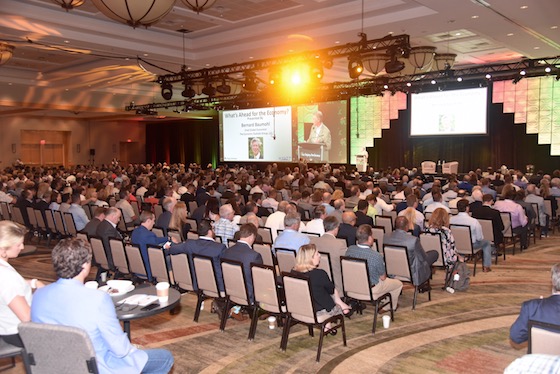What’s the consensus from the 2019 Lodging Conference in Phoenix this week? Among other insights, sector observers say the U.S hotel industry will remain stable until next year’s presidential election and that interest rates will remain attractive for further development, which will predominantly be seen in limited-service hotels.
Here is a roundup of their comments:
Bernie Baumohl, chief global economist, The Economic Outlook Group
- With so many geopolitical events, how many more blows can this aging business cycle take?
- It’s a pivotal moment in U.S. economic history: The fundamentals look great with high employment, strong consumer spending, limited inflation and ample capital. Those are not symptoms of recession, but there are undercurrents of fear. It is extremely difficult for a liquid economy to fall into recession, so it would require negative events to derail the economy, which he does not see – no high interest rates, geopolitical eruption or oil price issues
- Concerns: A festering trade war could starve the manufacturing sector and more deeply impact construction costs. An interim trade agreement between the U.S. and China would help both economies. If that happens, he sees GDP growth of 2.2% this year and 2.3% for 2020. Or, if the trade conflict is not resolved and there is more geopolitical disruption (think Hong Kong and Iran) expect 1.8% GDP growth in 2020, and it could cause a recession. A big trade agreement between the U.S. and China would be major propellent for economic growth and could lead to 3% GDP growth in the years ahead.
- The “eye of the political storm” is nearing with the upcoming U.S. presidential election
- Further lowering the federal interest rate won’t help the economy
- Consumers continue to be the bedrock of the current economy. E-commerce is sustaining consumer spending and acting as a deflationary force.
- Chill in business capital spending is due to the lack of clarity in the economic outlook.
- He doesn’t see a recession with 2% GDP growth for a few years. Focus remains on consumer spending and employment.

Vail Ross, senior vice president, global business development and marketing, STR
- There are 1.3 billion available rooms to sell each night in the world and the industry is hitting all-time high revenue numbers
- Construction is up 10% from last year and close to the peak. Hoteliers in the U.S. will open 690 hotels totaling 77,000 rooms, this year.
- About 11,000 rooms have gone offline this year in the U.S., a number that typically reaches 25,000 by year-end. STR doesn’t expect that number to be hit this year. Occupancy is flat and ADR growth is up about 1.1%. Adjusted for inflation for the past four quarters, it suggests negative ADR growth. Don’t expect that to change near term.
Ben Bates, commercial excellence manager, Booking.com
Some Gen Z observations:
- 69% have a bucket list for travel, and they consider researching those trips to be a feel-good task
- 71% say travel planning is overwhelming and confusing, so having technology assets to make your hotel more visible during their planning stage is critical
- They are looking for products to trust
- 34% say they are willing to travel alone, but such offers are not as available for leisure travels
Mark Lamanno, partner and senior adviser, Kalibri Labs
- There’s been a noticeable decline in property direct bookings (down 6.3% over the past years)
- Brand.com and OTAs are realizing 3.9% and 4.6% growth, respectively. July 2019 marked the first time Brand.com was the top channel for booking.
Adam Lair, managing director and senior partner, HVS
- In 2018, transactions were up, but this year they are down significantly – down 8% generally and down 10% for full-service assets. The economy is to blame as softer gross operating profits (GOPs) are causing investors to stick to their guns on required GOP returns.
- Every 1% in expense growth creates a 7% decline in value, hypothetically. If slower RevPAR growth and robust expense growth continues, investors will adjust return requirements and prices could soften.
J.P. Ford, principle, Lodging Econometrics
- There are 626 projects in the U.S. pipeline without a brand
- Supply is expected to grow from 2.2% to 2.5% for the next three years
- Transaction volume in the first half of 2019 was very much off last year’s pace and is likely to fall far short for the full year.
Mark Woodworth, national practice leader of Americas research, CBRE Hotels
- Sustained occupancies going forward
- Pricing power is weak and will remain that way

